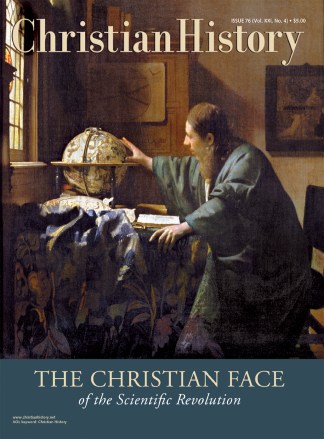In this series

On an unforgettable night in 1577, a mother took her 5-year-old son to the top of a hill to view the bright path of a comet. The boy was Johannes Kepler (1571-1630), and that night his life course was set.
The reverent wonder of that experience shines from Kepler’s later description of Copernicus’s cosmology—which he was the first to publish in textbook form.
Kepler imagined the heliocentric universe as a reflection of the Trinity: The sun at the center represented God the Father, the outer sphere of stars represented Jesus Christ, and the intervening space represented the Holy Spirit.
This vision of the stars as a window into the eternal sustained the Lutheran astronomer through a life of unremitting suffering.
His father, a mercenary soldier, went missing in action when Johannes was 16. Kepler’s first wife died, and he lost several children from both his first and second marriages. He was persecuted by the Catholic Church and excommunicated from the Lutheran church over views of the Lord’s Supper that were later changed. He endured the death from drink of his employer and mentor, Danish astronomer Tycho Brahe; the descent into madness and death of his patron, the Holy Roman Emperor Rudolph II; and the arrest and threatened torture (which his intervention averted) of his mother for the crime of witchcraft.
Schooled not only in mathematics and astronomy but also in theology, Kepler initially intended to serve as a minister. However, in 1594 Lutheran authorities assigned him a job as a mathematics teacher in Graz, Austria. There his duties included compiling an annual calendar of astrological predictions, which he did with reluctance and cautious generality.
In 1596, Kepler published his Cosmographic Mystery, on the spacing of the planetary orbits. On the eve of its publication, he wrote to his astronomy teacher at the university of Tubingen, Michael Maestlin, “I am devoting my effort … for the glory of God, who wants to be recognized from the Book of Nature.”
Kepler’s efforts produced their most famous fruit in his first two laws of planetary motion, published in his 1609 masterpiece, The New Astronomy, and his third law of planetary motion, discovered in 1618. These laws set the stage for the emerging scientific revolution. Fifty years later, Isaac Newton’s search for an underlying explanation for Kepler’s laws led him to formulate his own law of universal gravitation.
Kepler followed up The New Astronomy with his Epitome of Copernican Astronomy (1616). He sent a copy to Galileo, who responded that he had been a secret Copernican for several years and was collecting physical proofs of the earth’s motion.
Johannes Kepler died in Regensburg on November 15, 1630, and was buried in the Protestant cemetery. As if God was honoring the astronomer’s lifelong dedication to glorifying Him through the study of the stars, several witnesses reported that fireballs—now known as meteors—fell from heaven that evening.
Joseph L. Spradley is a professor of physics at Wheaton College, Wheaton, Illinois
Copyright © 2002 by the author or Christianity Today/Christian History magazine. Click here for reprint information on Christian History.










